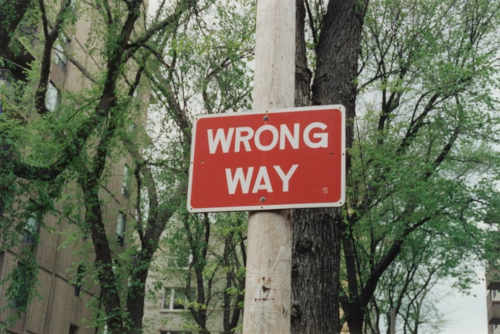If your resume isn’t getting you any responses and you’re wondering why, then this article is for you. There are many reasons why a recruiter or company might reject your resume, and often it’s because you have something on it that makes the person reading it pass right over.
So, what are they? What are these things that are red flags for anyone who is reading a resume?
You want to make sure that you make the best impression when you are sending out your resume.
There are a lot of little things that you should never put on your resume. The thing is, not many people are aware of them.
Obviously, if you’re one of the people who have not had any success with sending out your resume, then it’s a good idea to review your resume and see if there are glaring errors or things on your resume that shouldn’t be there.
As a quick note before we get any further, just because you might have paid a resume writing service to compose your resume it doesn’t mean that you shouldn’t review it. Professional resume writers run the gamut from people who have never done recruiting and are just glorified copy editors, to experienced recruiters who have reads thousands of resumes. The problem is that they don’t care as much as you do about your resume. After all, it’s a gig for them and they don’t really care if you get a job as long as you think the resume looks good.
Now let’s get right to the things you should never put on your resume. And there’s quite a few to go over, so settle in.
Your Age

There’s no reason you should ever list your age on your resume. It’s totally inappropriate. In fact, the only times I’ve ever come across this was on foreign resumes from overseas. Apparently it’s more common in countries in the Middle East and East Asia. Foreign Nurses often list their gender and age.
That’s totally inappropriate and unnecessary in the United States.
Employers can’t ask your age either. Of course, if you list a long series of jobs heading back forty years, then they can guess. That’s why it’s best to have a short resume and not list a ton of jobs with years.
Ageism is a real thing in the workplace. Unless you work for a large union or government program, dealing with ageism is tricky and can be both hard to navigate and soul crushing.
One thing you really shouldn’t do is lead with your age. Even if you’re a young person and think that it’s an asset.
Listing your age just looks really unprofessional.
Now, if you want to disguise your age, then you can go one step further. What most experts suggest is to not list the dates you graduated college and also cut off the first few jobs if you’re concerned about people finding out your age.
Even if the employer is ageist, which you’ll have no way to know, you don’t want to lead with your age.
Some employers might easily be ageist if they are just looking at a paper, but if you manage to get in front of them and sit for an interview, then you’ll be less likely to be the victim of an ageist employer.
Hobbies: No One Care’s That You Horseback Ride

Hobbies have no place on your resume. No one cares if you like to go swimming or ride horseback on the weekend. It’s just not professional to list random hobbies that you have.
Many people make this mistake, and to be sure, it’s not a huge issue. It’s not really going to kill your chances of getting a job.
At most, it might make someone’s eyes roll. But it’s not a big no-no.
Unless, of course, your hobbies are so bizarre to strike someone as odd.
What’s odd? Well that’s relative right, but things that people commonly list as hobbies include: swimming, horseback riding, yoga, cycling, and other things.
If your hobby is something out of the norm like taxidermy, for instance, then it can actually be a problem. You want to avoid creating the impression of strangeness in people who you are seeking to find a job through.
So, leave hobbies off your resume.
What High School You Went To
(Unless You Didn’t Go To College)
There’s no reason to list the high school you went to. No one cares where you went to high school, with the exception of elite prep schools.
Again, this isn’t a serious no-no, but it does make you look a bit strange. You should only list the place where you went to college.
The exception to this is if you didn’t go to college. In that case, you can list your high school and the year you graduated.
However, there is some debate as to if you should actually list a high school on your resume.
If you didn’t go to college, then certain jobs are not going to want to hire you. However, there are still plenty that do.
In the case that you’re applying for those jobs, then it’s more important to show some work experience either in the form of entry level jobs, internships, or school training programs.
Work such as Medical Assistants, Nursing Aids, and labor roles don’t require a college degree. These fields will hire people straight out of high school.
If you’re working in one of these fields, you are best served putting a recent job history on your resume and only listing your high school if you’ve just recently graduated and have limited work experience.
If you are someone who has not gone to college, and are someone who is looking for manual labor work or medical work, then there are plenty of staffing agencies that cater to those roles.
As a matter of fact, some staffing agencies exclusively deal in labor type temporary placements such as warehouse work. The important part is to make sure you can find the right type of staffing firm. You don’t want to waste time with a staffing firm that doesn’t have the jobs that you are going to be hired for.
An Amateur Photograph
As a rule, you shouldn’t put a photography on your resume. The only times it makes sense is if you’re photogenic (a nice word for attractive) and if the job requires that, so that means jobs like account executive or sales executive.
However, you should only consider placing a photo on your resume in very special circumstances, and even then only if it’s a professional photo. You don’t want an amateur selfie on your resume. Even if you’re attractive, an amateur photo will look weird and make a bad impression.
If you want to make sure that the recruiter or the person at the company where you’re applying to work sees what you look like, then what you should do is add a link on your resume to your LinkedIn profile.
That way the employer can click on the hyperlink (make sure to add the link and hyperlink it on either a PDF or word version) and they can see what you look like.
If you do link to your LinkedIn profile, then you should make sure that there is a good photo on it. You don’t want to have a lackluster LinkedIn profile, and if you do have one either fix it or don’t list it on your resume.
A Personal Statement
A resume isn’t the place for a personal statement. There’s no reason to include this on your resume. At best it’s something a recruiter or job interviewer will skip over and not read.
At worst it will stick out and make someone shake their head and not hire you.
Personal statements can sound juvenile. Or perhaps like someone who isn’t familiar with proper workplace etiquette.
The idea behind a personal statement is that you want your future employer to understand something important about you. Something that can’t come across from your work experience.
The problem is that recruiters and employers don’t care about your hopes and dreams. It sounds harsh, but it is the truth.
Well meaning people who write essays on how to express yourself, or something that sounds like that.
The truth is that in the business world, no one cares about anything besides how you can benefit them. They will want someone who will work for the least amount of money and who is the most productive person. Even in non-profits and government run programs, it’s less about your interests and more how you can benefit them.
Non-Professional Awards
There’s little benefit to listing non-professional awards on your resume unless you are a recent graduate and the awards are academic in nature.
For instance, if you are someone who was on a finalist list for a well known scholarship program or fellowship program, then it would be beneficial for you to go ahead and put that on your resume.
If you are someone who has been in the workforce for many years then it’s not necessary for you to list these on your resume.
If you’re an academic, then of course you should list these on your C.V. but again, these are totally different types of resumes and are not the same as professional resumes.
Keep any awards off your resume unless they are professional.
“Unemployed”
You never want to lead off with the word Unemployed. It’s a word that has a negative connotation.
It sounds odd, but most employers don’t want to see that listed on your resume.
The idea is that people who are unemployed are desperate, or else they are not people who want to work.
Of course that’s not a real and accurate depiction of people who are looking for work, but nevertheless it is something that people think.
There is no reason why you need to directly write unemployed on your resume. It’s not needed. If you are creating a resume, then by that very fact it means that you are seeking work.
People who are working and who do not want to find a new job don’t create resumes and send them out.
Likewise, people who aren’t working and don’t want to work don’t send out resumes.
If you are sending out a resume, the understood message is that you’re either not working or are looking to leave your current workplace.
Bad Grammar and Misspellings
This one is a major mistake to be careful of. You never want to have a misspelling or a grammatical mistake on your resume.
If a potential employer or a recruiter notices mistakes on your resume then they will likely pass by it and move on to the next one.
If the mistake is something insignificant such as a comma where a semicolon should be, then that’s not much of an issue.
But if there are glaring mistakes on your resume such as misspelled words, or missing periods, then you’re going to be viewed as someone who isn’t a competent and professional person.
It doesn’t require much time to proofread a resume. If you run it through a basic spell check program, then you’ll find mistakes. But if you don’t run it through then you should at least have someone do a pass through read of it.
Your References Names and Contact Info
Another thing that you’ll need to avoid putting on your resume are references.
You really shouldn’t even list that you have references or that you’ll supply them on request. It’s expected that you will provide references if asked, so there is no reason to put this down on your resume.
The more problematic issue is if you actually list out your references name and their contact info.
This is completely unprofessional and it will be viewed as strange by any recruiter or hiring manager.
There is absolutely no reason for you to list out the names and phone numbers or emails of your references.
Anyone who looks at your resume and sees that you have written out someone’s personal info will immediately be taken aback. Having this sort of information on your resume means that you’re someone who isn’t aware of professional etiquette.
Think about it, would you want your name and telephone number or email being listed on someone’s resume that is being sent in to major job bulletins like Indeed or even places like Craigslist?
Of course not, so then don’t do it yourself.
Artwork or Weird Designs
This one should be obvious, but oftentimes it’s not. You should not decorate your resume with elaborate designs or anything else that is non-standard.
Stick with using resume templates that you can find online and don’t deviate from the standard look of a classic resume.
Even if you are working in a creative field, you should not approach resume making as a creative task. A resume is a list of credentials and work experience. That’s it. Your resume is not your work portfolio.
There are a variety of resumes to choose from. Just because I’m saying you shouldn’t add artwork it doesn’t mean that the resume has to be boring. There are plenty of interesting designs that are available to download through Canva or MS Word templates.
Just stay clear of adding extraneous graphics to the resume. It’s not the place to express yourself.
Skills You Don’t Have
While some people think that they can bluff their way into a job, listing skills isn’t going to help.
In fact, while it might get your foot in the door if the interviewer never specifically quizzes on the skills, you’ll certainly not keep the job.
Let’s take the example someone who claims to have an expert level of Excel and they somehow are hired for a role that requires the person to be proficient in Excel. Not just someone who can use the software somewhat, but rather someone who really knows how to handle V-Lookup and create pivot tables and run data analysis.
What will happen is that you’ll be found out and will lose the job.
It happens pretty often that people lie on their resume. The problem is when you lie about having a skill that you don’t have. Once you’re caught as being `deceptive on your resume then your boss is going to want to get rid of you. You’re not going to have the privilege of letting them get to know the “real you”. The you they will know is the one who lied on their resume about knowing something they didn’t know.
So, just don’t list a skill unless you really know it. For instance, in the above example, Excel is pretty common and it’s safe that most people can list it. It’s when you say things like “expert” or if you truly have no idea about the software (such as NetSuite or QuickBooks) but just tag it onto your resume because you happen to see a job that requires it.
Future Jobs
Never list you’re a future job on your resume. It makes you look completely delusional. People who put future jobs on their resume look completely delusional and out of touch with reality.
If you want to work at a company or in a particular industry, then it is your own personal goal. It’s not something that you want to put on a resume.
If you have a job lined up, that also shouldn’t be on your resume. So, for instance, if you have a internship or job lined up in 6 months from now but are looking for a short term job, you might be tempted to add that to your resume.
However, you don’t want to do that. It looks confusing but it also alerts the recruiter or job hiring manager that you’re not going to be available to work after a certain time.
There’s no reason for you to inform a potential employer that you are going to leave a job once you take it.
Personal Information: Illness, Stay-at-home Parent, Etc..
This ties into the fact that you want to keep all personal information off the resume. It’s not a discussion that you need to initiate on your resume.
There are many reasons why people need to take time off work. It might be a family issue, or it might be a medical issue. Those questions should not be addressed on the resume.
Off-The Books Work
It looks bad to put on your resume that you work off the books. The phrase itself just looks bad.
There is no reason to write the phrase “off the books”. It’s just unnecessary. You can list the work without writing that it was off the books.
If you are concerned about the fact that your old employer won’t verify your employment, well that is something to handle when you come to it. Most of the time a recrutier won’t call your boss, current or old, without letting you know.
Just approach writing your resume in the same way you would normally. If it comes to the point where you are going to get the job, then you can discuss with them that the employer paid you off the books. But don’t bring it up beforehand.
The best thing to do is to have a plan on how to discuss your career gap once it comes up during an interview.
Gambling even Professional Gambling
It should go without saying that you shouldn’t list gambling on a resume. Some people like to list poker or blackjack on a resume as hobbies thinking it makes them sound cool. Or maybe they have seen one too many Hollywood movies where poker players or MIT blackjack card counters are smart and make lots of money.
Well, the truth is that those are fictional accounts and in the real world almost everyone considers gambling a liability. No one wants an employee who likes to gamble. They are seen as addicts and possibly people who might steal money from work.
Now, in some circles I’ve heard of people listing poker or sports betting on their resumes, but they never got the job. The fact is that professional workplaces don’t want people who gamble working for them.
It’s seen as completely antithetical to a professional environment. Some people might think that they can list working as a “professional poker player” or sports bettor or black jack player as a solution to a resume gap, but it really only makes the situation worse.
Add to this the fact that most people who claim to make money as professionals are really just delusional gamblers.

Jennifer Miller- Recruiter and career advisor. Here to share wisdom to help you learn how to work with recrutiers. If you’ve got any questions, feel free to send me a question and I’ll do my best to answer it!
You can also check out some of my writing at Medium here.

